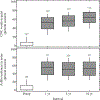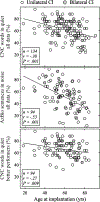Speech Recognition as a Function of Age and Listening Experience in Adult Cochlear Implant Users
- PMID: 34043247
- PMCID: PMC8363561
- DOI: 10.1002/lary.29663
Speech Recognition as a Function of Age and Listening Experience in Adult Cochlear Implant Users
Abstract
Objectives/hypothesis: Speech recognition with a cochlear implant (CI) tends to be better for younger adults than older adults. However, older adults may take longer to reach asymptotic performance than younger adults. The present study aimed to characterize speech recognition as a function of age at implantation and listening experience for adult CI users.
Study design: Retrospective review.
Methods: A retrospective review identified 352 adult CI recipients (387 ears) with at least 5 years of device listening experience. Speech recognition, as measured with consonant-nucleus-consonant (CNC) words in quiet and AzBio sentences in a 10-talker noise masker (10 dB signal-to-noise ratio), was reviewed at 1, 5, and 10 years postactivation.
Results: Speech recognition was better in younger listeners, and performance was stable or continued to improve through 10 years of CI listening experience. There was no indication of differences in acclimatization as a function of age at implantation. For the better performing CI recipients, an effect of age at implantation was more apparent for sentence recognition in noise than for word recognition in quiet.
Conclusions: Adult CI recipients across the age range examined here experience speech recognition benefit with a CI. However, older adults perform more poorly than young adults for speech recognition in quiet and noise, with similar age effects through 5 to 10 years of listening experience.
Level of evidence: 3 Laryngoscope, 131:2106-2111, 2021.
Keywords: Advanced age; cochlear implantation; geriatric; speech perception.
© 2021 The American Laryngological, Rhinological and Otological Society, Inc..
Conflict of interest statement
Conflicts of Interest
AM, MWC, SAD, and MMD declare that their involvement was conducted in the absence of any commercial or financial relationships that could be construed as a potential conflict of interest.
Figures


Similar articles
-
Cochlear Implantation in Adults With Asymmetric Hearing Loss: Speech Recognition in Quiet and in Noise, and Health Related Quality of Life.Otol Neurotol. 2018 Jun;39(5):576-581. doi: 10.1097/MAO.0000000000001763. Otol Neurotol. 2018. PMID: 29683995
-
Effects of Bilateral Cochlear Implantation on Binaural Listening Tasks for Younger and Older Adults.Audiol Neurootol. 2022;27(5):377-387. doi: 10.1159/000523914. Epub 2022 May 30. Audiol Neurootol. 2022. PMID: 35636400
-
Longitudinal outcomes of cochlear implantation and bimodal hearing in a large group of adults: A multicenter clinical study.Am J Otolaryngol. 2021 Jan-Feb;42(1):102773. doi: 10.1016/j.amjoto.2020.102773. Epub 2020 Oct 22. Am J Otolaryngol. 2021. PMID: 33161258
-
Meta-analysis of quality-of-life improvement after cochlear implantation and associations with speech recognition abilities.Laryngoscope. 2018 Apr;128(4):982-990. doi: 10.1002/lary.26738. Epub 2017 Jul 21. Laryngoscope. 2018. PMID: 28731538 Free PMC article. Review.
-
Image-Guided Cochlear Implant Programming: A Systematic Review and Meta-analysis.Otol Neurotol. 2022 Oct 1;43(9):e924-e935. doi: 10.1097/MAO.0000000000003653. Epub 2022 Aug 17. Otol Neurotol. 2022. PMID: 35973035
Cited by
-
Effect of Cochlear Implant Electrode Insertion Depth on Speech Perception Outcomes: A Systematic Review.Otol Neurotol Open. 2023 Dec 14;3(4):e045. doi: 10.1097/ONO.0000000000000045. eCollection 2023 Dec. Otol Neurotol Open. 2023. PMID: 38516541 Free PMC article.
-
The recognition of time-compressed speech as a function of age in listeners with cochlear implants or normal hearing.Front Aging Neurosci. 2022 Sep 29;14:887581. doi: 10.3389/fnagi.2022.887581. eCollection 2022. Front Aging Neurosci. 2022. PMID: 36247992 Free PMC article.
-
Outcomes of Cochlear Implantation in Age Subgroups of Veterans Over 50 Years Old.Otol Neurotol Open. 2023 Aug 28;3(3):e037. doi: 10.1097/ONO.0000000000000037. eCollection 2023 Sep. Otol Neurotol Open. 2023. PMID: 38515639 Free PMC article.
-
Cochlear Implantation in US Military Veterans: A Single Institution Study.OTO Open. 2023 May 12;7(2):e53. doi: 10.1002/oto2.53. eCollection 2023 Apr-Jun. OTO Open. 2023. PMID: 37187572 Free PMC article.
-
A country-wide health policy in Chile for deaf adults using cochlear implants: Analysis of health determinants and social impacts.PLoS One. 2023 Oct 25;18(10):e0286592. doi: 10.1371/journal.pone.0286592. eCollection 2023. PLoS One. 2023. PMID: 37878655 Free PMC article.
References
-
- Wick CC, Kallogjeri D, McJunkin JL, et al.Hearing and quality-of-life outcomes after cochlear implantation in adult hearing aid users 65 years or older a secondary analysis of a nonrandomized clinical trial. JAMA Otolaryngol - Head Neck Surg Published online2020. doi:10.1001/jamaoto.2020.1585 - DOI - PMC - PubMed
-
- A.A. E, M. R, T.J. B, et al.Cochlear implant surgery in patients more than seventy-nine years old. Laryngoscope Published online2009. - PubMed
Publication types
MeSH terms
Grants and funding
LinkOut - more resources
Full Text Sources
Other Literature Sources
Medical
Research Materials
Miscellaneous

